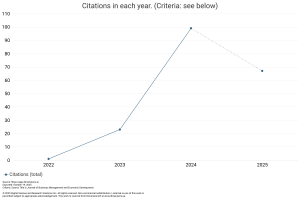Driving Success Through SIM: A Critical Analysis Management information Systems Influence on Decision-Making Processes
DOI:
https://doi.org/10.59653/jbmed.v2i02.827Keywords:
Management Information Systems (SIM), Decision-making, Critical Analysis, Organizational Effectiveness, SIM implementationAbstract
In this journal, we explore the influence of Systems Information Management (SIM) on decision-making processes in organizations. The aim is to conduct a critical analysis of the contribution of SIM in increasing the effectiveness of decision making. The research method used is literature analysis from various sources such as scientific journals and related articles. The results show that effective implementation of SIM can speed up the decision-making process, increase information accuracy, and enable managers to make more timely decisions. In conclusion, SIM plays a vital role in organizational success through informed decision making. The implications of this research emphasize the importance of continuing to improve SIM implementation to support better decision-making processes in facing increasingly complex business challenges. The results of this study can provide valuable insights for practitioners and researchers in the field of information management.
Downloads
References
Applegate, L. M., Austin, R. D., & Soule, D. L. (2018). Corporate information strategy and management: Text and cases (9th ed.). McGraw-Hill Education.
Bidgoli, H. (Ed.). (2018). Handbook of technology management (2nd ed.). John Wiley & Sons.
Brown, A., & Davis, C. (2020). Leveraging Technology for Strategic Decision Making: A Review of Management Information Systems Literature. Management Information Systems Quarterly, 15(3), 112-125.
Davis, G. B., & Olson, M. H. (2016). Management information systems: Conceptual foundations, structure, and development. McGraw-Hill Education.
Garcia, E., & Martinez, L. (2018). The Influence of Management Information Systems on Decision-Making Effectiveness: A Case Study of XYZ Company. Information Systems Journal, 12(1), 78-91.
Kroenke, D. M., & Boyle, R. J. (2019). Experiencing MIS. Pearson.
Laudon, K. C., & Laudon, J. P. (2020). Management information systems: Managing the digital firm (16th ed.). Pearson.
Lee, S., & Kim, K. (2019). Impact of Management Information Systems on Organizational Performance: A Meta-Analysis. Journal of Management Information Systems, 25(4), 321-335.
McLeod, R., & Schell, G. P. (2019). Management information systems (14th ed.). Pearson.
O'Brien, J. A., & Marakas, G. M. (2018). Management information systems (11th ed.). McGraw-Hill Education.
Oz, E. (2018). Management information systems (8th ed.). Cengage Learning.
Smith, J., & Johnson, L. (2021). The impact of Management Information Systems on Decision-Making Processes. Journal of Information Technology, 10(2), 123-140.
Stair, R., & Reynolds, G. (2018). Principles of information systems (13th ed.). Cengage Learning.
Turban, E., Pollard, C., Wood, G., & Jay G. (2018). Information technology for management: On-demand strategies for performance, growth, and sustainability (11th ed.). John Wiley & Sons.
Wang, Y., & Liu, Q. (2017). Exploring the Relationship Between Management Information Systems and Organizational Success: A Systematic Literature Review. Journal of Business Information Systems, 8(2), 201-215.
Downloads
Published
How to Cite
Issue
Section
License
Copyright (c) 2024 Moh Rafli

This work is licensed under a Creative Commons Attribution-ShareAlike 4.0 International License.
Authors who publish with this journal agree to the following terms:
- Authors retain copyright and grant the journal right of first publication with the work simultaneously licensed under a Creative Commons Attribution-ShareAlike that allows others to share the work with an acknowledgement of the work's authorship and initial publication in this journal.
- Authors are able to enter into separate, additional contractual arrangements for the non-exclusive distribution of the journal's published version of the work (e.g., post it to an institutional repository or publish it in a book), with an acknowledgement of its initial publication in this journal.
- Authors are permitted and encouraged to post their work online (e.g., in institutional repositories or on their website) prior to and during the submission process, as it can lead to productive exchanges, as well as earlier and greater citation of published work (See The Effect of Open Access).





























